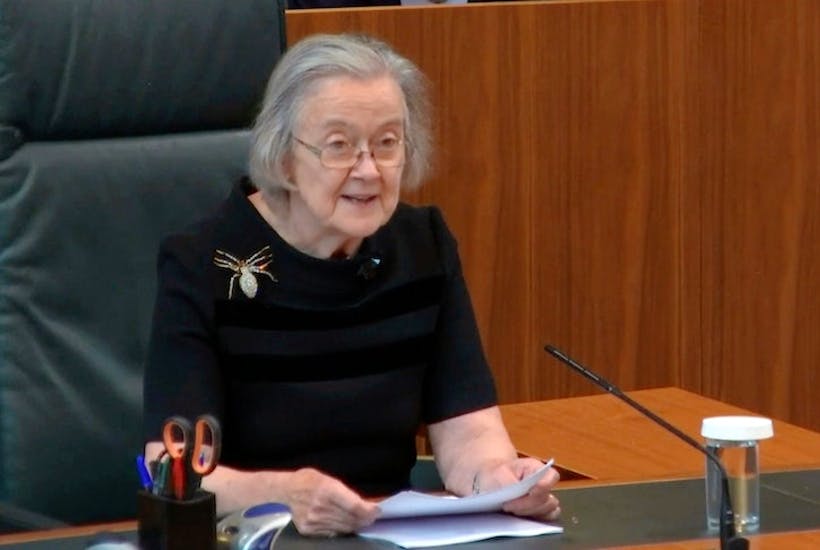Ruth Bader Ginsburg likes her office. The US Supreme Court justice, a spry 86-year-old who trains twice a week with an ex-Special Forces soldier, is a liberal icon on America’s highest court. A decade ago, she gave an interviewer a tour of her chambers, explaining: ‘I like a quiet place and I am glad to be overlooking the courtyard and not the front of the building, and so I’m not disturbed by demonstrators.’ Demonstrators are a hazard of the job for a court that is, when all the polite artifice is stripped away, a supreme legislature of nine. On sitting days, when the rawest of issues are being decided, the more excitable among the citizenry gather for a spirited discussion about which side has the greater predilection for infanticide. If nothing else, the placards are sometimes inventive.
The origins of America’s judicial wars are typically traced to the Court’s 1973 abortion decision in Roe v. Wade, but their intellectual casus belli is the debate over whether the constitution should be interpreted consistent with its original meaning or whether it is a living document that draws its meaning, in the coinage of Earl Warren, from ‘the evolving standards of decency that mark the progress of a maturing society’. Properly, we ought to go back further still, to the ‘Four Horsemen‘ of the Hughes Court: the market ideologue justices who dreamt up respectable-sounding principles to justify striking down plainly constitutional New Deal legislation 40 years before Roe v. Wade. It’s only ever ‘judicial activism’ when you don’t like the outcome.
We should get used to the phrase ‘judicial activism’ because we are going to be hearing a lot more of it. The UK Supreme Court’s ruling on prorogation is, in the eyes of Brexiteers, Britain’s Roe, an imposition on the voters of what the political class could not win at the ballot box. The accuracy of this interpretation is not immaterial but it cannot compete with the instinctual force it wields for some. The establishment is out to do in Brexit — in parliament, in Brussels and in the courts. The judiciary is now seen as part of that effort and, in the absence of Brexit, will bear the brunt of Leavers’ anger.
A leak to BuzzFeed confirms the trajectory. Tory insiders, the site says, believe the Court’s decision ‘will ultimately result in a written constitution, the scrapping of the Human Rights Act, and either a US-style Supreme Court with appointed judges or the abolition of the Supreme Court and a return to the old English system of Law Lords being the final court of appeal’. It’s not obvious how reverting to Law Lords would have prevented Tuesday’s outcome and a codified constitution is even more of a boon to ‘judicial activists’ than our present hodge-podge. Backlash seldom lingers on details.
Not just Leavers’ righteous contempt for the Court’s interference but also Remainers’ unseemly fangirling of Lady Hale confirms where things are headed. Ruth Bader Ginsburg has become a liberal celebrity, nicknamed the Notorious RBG and the subject of a vast array of merchandise, a motion picture, and write ups in progressive media that recall studio-era fanzines gushing over the every purr of Lauren Bacall and Katharine Hepburn. The US judiciary can handle this because it’s already politicized all to hell, but for the UK bench it carries obvious risks. The British Supreme Court is too new an institution to have justices claimed as icons by one side of politics or another. This is the Big Bad we’ll have to face in the season finale.
Yet if Brexiteers want US-style judicial confirmations, who will deny them? If they want the staffers of Members of Parliament ringing round Girton College alumni asking if Brenda Hale ever sparked up a joint, who will tell them no? If they want the full Brett Kavanaugh for every senior jurist, who will say they can’t have it? After all, if the Tory party is to become a populist party, then this is the kind of thing populists do. How many Conservative MPs will be defending the independence of the judiciary at their next local association meeting? And if Remainers want to carve graven images out of wise old lawyers with spider brooches, who on their side is going to whisper that partisan idolatry doesn’t much help judicial independence either? There are no retweets in caution.
MPs are learning new things about themselves. After decades of fighting to restore parliamentary sovereignty, Eurosceptics have realized that wasn’t what they wanted after all. Labour ‘moderates’ who made their peace with Corbyn’s extremism are looking at the Tory backbenches and seeing for the first time what they have looked like for the past four years. We in the hopeless commentariat keep churning out nonsense about ‘the crisis in the UK political system’ but there is no crisis. The government tried to pull a fast one, the judges ordered it back to Parliament, and back to Parliament it went.
The system works but those who work in it no longer do. MPs made this happen. They chose and continue to choose this daily humiliation before the world. They voted for a referendum, vowed it would be honored, voted to trigger Article 50, campaigned on election manifestos sworn to deliver Brexit, all the while hoping some last-minute twist or deal or iudex ex machina would save them. They prevented a Brexit deal but will not permit no deal. They will not allow the ministry to govern but nor can they agree to govern between themselves. They clamor for an election but refuse to vote to bring one about. Is it any wonder some long for another prorogation and others turn to the courts for legislators?
This government is wretched but this Parliament is a rabble. It must go.
This article was originally published on The Spectator’s UK website.


























